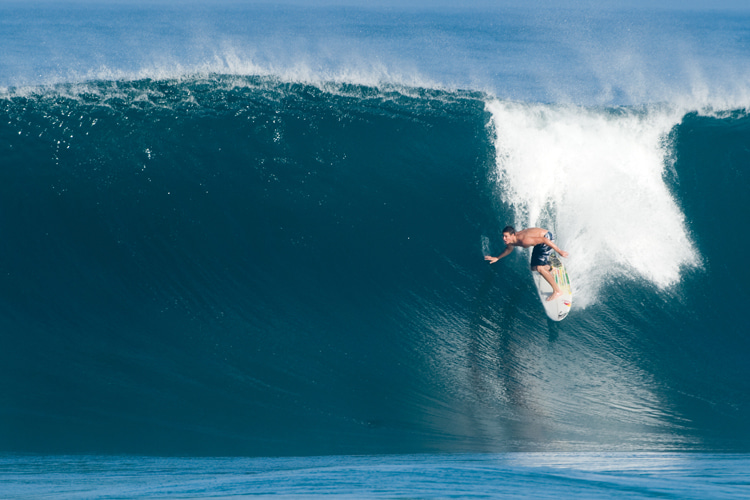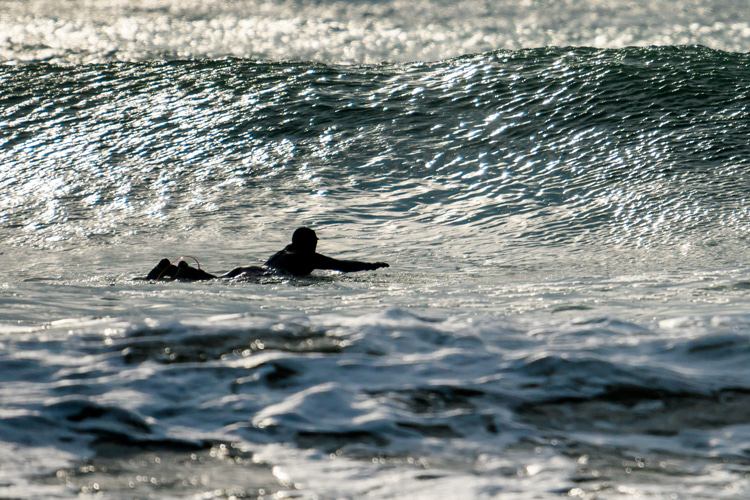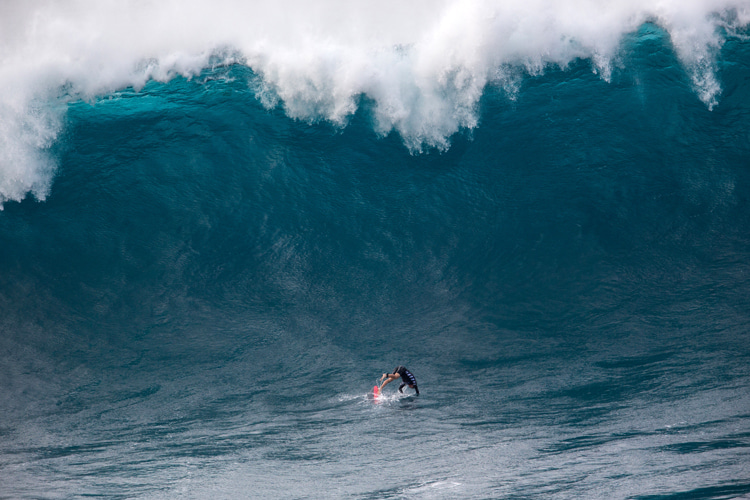I have been surfing for the past six years now. I’m far from being a great surfer, but being 42 years old, I’m pretty happy with my decent level.
Even if it sounds a bit cliché, surfing literally changed my life and completely shifted my priorities.
The series of stories “The Mind of Surfing” I’m about to start is a reflection of this journey.
Physically, wiping out on a wave is probably the closest to a boxing fight your body can be. You feel dismantled, with your right leg going one way while your left arm is going the opposite.
You lose all your peripherals, and any kind of notion of where the up and down are is gone. Most of the time, you will be held down for seconds.
But those seconds are going to feel like infinity.
Of course, anyone will tell you they can hold their breath for a good minute in their hot and steamy shower. Well, now try to hold your breath while a football team is crushing you.


Hold-Downs: The Surfer’s Nightmare
In my first year of surfing, while being held down, I remember thinking: “OK, it looks like I don’t have air anymore in my lungs. Now would be a good time for the ocean/wave/whatever to push me back up.”
But nothing happens. And the first time it occurs to you, you will panic.
Just for the sake of being pragmatic, panic is simply a waste of oxygen preventing your brain from functioning normally and is the most ineffective way to get out of a stressful and sometimes dangerous situation.
Period.
Yesterday, even before getting out of my car and getting into my wetsuit, I could feel the fear rolling down my spine.
The scenery was everything but peaceful.
Stormy black clouds, waves crashing against the shore, strong offshore wind, and the rain was about to crack.
I checked the line-up from inside my car. A handful of surfers were already at the peak and seemed to surf way better than I do.


Managing Fear
I have always been more comfortable surfing clean and glassy bigger waves under the summer sun on the West Coast of France than smaller ones in nasty weather.
And yesterday was not a sunny one.
The Hawaiian surf postcard is nowhere to be found. Out there today, it’s a war. And when you are watching this kind of action from afar, that’s when the intense brain activity begins.
Is it too fat for me? Do I have what it takes to handle a wave this size crashing on my head or a wipeout in these conditions?
What if my leash breaks? Will I be able to swim back to the shore without the support of my lost or broken board?
Everybody has their own limits. The thing is: how do you know them if you never go in and find them?
In these moments, I even recollect thinking about my kids and my life to put things in perspective before going in, so the consequences of what you are about to do are fresh and clear in your mind.
It’ll give an extra ounce of carefulness if things start to get ugly. And all of that because I felt fear.
That’s pretty much why, carefully though, I always go in. Even just to get wet and catch no wave. To tell myself: “I was there in the middle of the storm to feel the element raging against my board.”


Catching a wave becomes almost the cherry on top when your main goal is just not to drown.
The ocean was beautiful, and I felt scared, in awe and humbled at the same time.
As an emotion, fear is far from panic.
It activates a portion of your brain called the hypothalamus, which releases a series of chemicals in your nervous system and adrenal cortical system.
From this point, and among many things that will happen in your body, your nervous system releases adrenalin, and everything kicks in.
You’ll find many studies about the science of fear, and one of them is particularly enjoyable to read “The Science Behind Fear,” by Ashley van der Pouw Kraan.
Fear is the most ancient emotion we have as humans and that we share with other species.
It’s the emotion that triggers a reaction to danger and therefore allows self-preservation and survival.
Remember how crazy fast you ran in that alley the night someone was following you? Remember that weird-looking Uber driver who was staring at you in the rear mirror?
You know what I’m talking about, right? It keeps us alive and allows us to perpetuate our good old human species.
Fighting Panic
For many people, panic is an everyday companion and has many ways and levels to express itself.
But what they all have in common is that they all require the same amount of discipline and mental strength to counter them.
After years of practice, I got used to it and developed some kind of mental power.
Down there, I know now that I always have to remember one simple thing if I don’t want to die – not to panic.
In the end, controlling panic has to do with letting go and having faith that everything will work out.
It sounds so simple and yet, takes a lifetime to master.
But I know that whatever it takes and whatever happens, I will always go back in the ocean. And write about it.
Words by Philippe Duvin | Creative Director and Surfer





Recent Comments